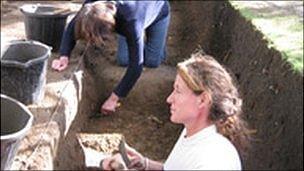Cambridge university college dig finds Roman village
- Published

Schoolgirls from Peterborough, London and Birmingham took part in the dig
An archaeological dig to explore Anglo-Saxon graves at Cambridge University has unearthed "unexpected" evidence that the site was once a Roman village.
Sixth-formers helped excavate gardens at Newnham College, inspired by the discovery of graves there during World War II.
They found evidence of a village and a farmhouse which may date back to the reign of Henry VIII, the college said.
The size of the settlement is greater than previously thought, it added.
During the late 1930s, skeletons - believed to be Anglo-Saxon - were found on the site during the construction of air raid shelters.
Dorothy Garrod, the University's first female professor, headed a team of women and excavated the graves using dessert spoons and toothbrushes.
The air raid shelters were covered with soil after the war and the exact location of the graves was lost.
'Complete surprise'
"We knew there was a Roman settlement here before but we had no idea of the size," said archaeologist Dr Catherine Hills.
"The village has been buried under the gardens for nearly 2,000 years, and may have seen the Roman conquest of Britain and Boudicca's revolt.
"The 16th Century farmhouse was a complete surprise."
The present day archaeological team were hoping to find the graves, but instead found Roman pottery.
Archaeologist Dr Carenza Lewis said: "East Anglia is rich in Roman and medieval remains just waiting to be discovered.
"People threw away a lot of rubbish, and their old pottery and animal bones are now allowing archaeologists to discover the existence of entire villages.
"We are starting to realise the huge extent of Roman settlement around this area."
The University said the mystery of the skeletons continues.
In July last year, Roman pottery, medieval remains and 11th Century dog bones were found beneath a tearoom in the university's central offices, known as the Old Schools.